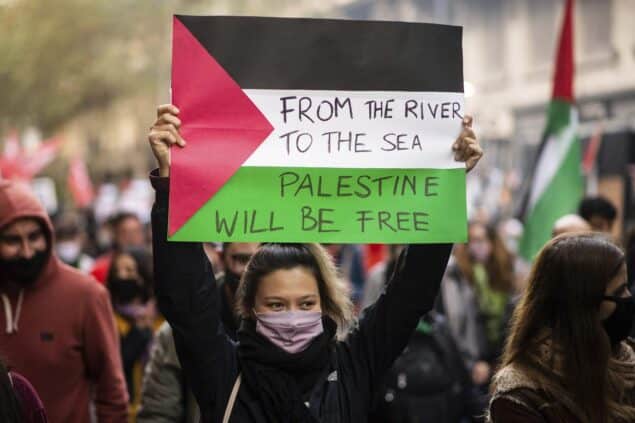Protestors at Palestinian marches have been heard chanting “from the river to the sea” – but what does the slogan mean and is it offensive?
Protestors who have joined Palestinian marches across the UK have been heard chanting “from the river to the sea”. It has been heard increasingly often after Hamas’ attack on Israel and the military operation in Gaza that followed it.
It is a fragment from a slogan used since the 1960s when the Palestinian resistance was led by the Palestine Liberation Organisation (PLO), a secular coalition of Palestinian nationalist and leftist parties. In the late 1960s , the PLO put forward an idea of Arab-Jewish coexistence in one democracy, arguing for Israel and the Occupied Territories to become “one secular, democratic state of Palestine” based on one person, one vote, where Arabs, Jews, Muslims and Christians would enjoy full equality. In 1969 the PLO had formally declared its goal “to establish a free and democratic society in Palestine for all Palestinians whether they are Muslims, Christians or Jews”.
The slogan is used by a variety of people with a host of purposes- and open to an array of interpretations. The full saying goes: “From the river to the sea, Palestine will be free” – a reference to the land between the Jordan River, which borders eastern Israel, and the Mediterranean Sea to the west.
Some claim the terminology is laced with genocidal intent. Hamas, whose gunmen killed 1,400 people on 7 October, claim the slogan in their rejection of Israel. The organisation’s 2017 constitution says: “Hamas rejects any alternative to the full and complete liberation of Palestine, from the river to the sea.”
The home secretary, Suella Braverman, tweeted on the social media platform X, formerly known as Twitter, that the slogan was “widely understood as a demand for the destruction of Israel” adding that “attempts to pretend otherwise are disingenuous.”
In 2021, the Palestinian-American writer Yousef Munayyer argued that those who saw genocidal ambition in the phrase did so due to their own Islamophobia. He argued that the slogan is merely a way to express a desire for a state in which “Palestinians can live in their homeland as free and equal citizens, neither dominated by others nor dominating them”.
Supporters of the Palestinians who chant this phrase, argue it simply means that everyone between those boundaries, including Israeli Jews, Palestinians, and Israeli Arabs, have full and equal rights – which they claim is currently not the case.
But the phrase causes anxiety for many vocal supporters of Israel, who are in the UK overwhelmingly Jewish and fear it is an existential threat to Israel as it is believed to be a call to replace Israel with Palestine.
In the UK, mice were poured into a McDonald’s in Birmingham over its perceived support for Israel, and the Wiener Holocaust Library was daubed with graffiti.
Incidents such as these put the question on whether those who chant the slogan really do just want freedom and equality for all the citizens living between the river and the sea.
As hundreds of thousands of pro-Palestine demonstrators have taken to the streets in recent weeks and over the past weekend, the Met said the chant had “been frequently heard at pro-Palestinian demonstrations for many years.
We are well aware of the strength of feeling in relation to it”. It added: “While we can envisage scenarios where chanting these words could be unlawful, such as outside a synagogue or Jewish school, or directly at a Jewish person or group intended to intimidate, it is likely that its use in a wider protest setting, such as we anticipate this weekend, would not be an offence and would not result in arrests. This is just one example of the difficult decisions facing officers.”
The police therefore do not interpret it as illegal when walking through the streets at a demonstration. On 10 October Suella Braverman wrote to police constables arguing it is “an expression of a violent desire to see Israel erased from the world, and whether its use in certain contexts may amount to a racially aggravated section 5 public order offence”.
Labour suspended their MP Andy McDonald after he chanted it at a rally. In a video shared by McDonald on X of his speech at the rally, he said: “We will not rest until we have justice. Until all people, Israelis and Palestinians between the river and the sea can live in peaceful liberty.” He went on to chant “free Palestine”, alongside the crowd. Thousands are able to chant it on the street however individual cases are picked upon, until it is made illegal under law.













